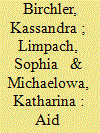| Srl | Item |
| 1 |
ID:
148031


|
|
|
|
|
| Summary/Abstract |
Many argue that autocratic regimes allocate revenues from foreign aid with the aim of stabilizing their rule rather than serving economic and social development. However, donors often condition foreign aid on reforms in recipient states. We argue that when those conditions for reform focus on participative processes and government accountability, they positively affect democratization. We evaluate our claim based on different types of World Bank and IMF lending programs for a panel of 100 low- and middle-income countries over the years 1980–2011. Our results suggest that aid positively affects democratization when it strengthens domestic accountability mechanisms and thereby reduces its fungibility for recipients. The World Bank and the IMF’s poverty reduction strategy programs provide a notable case of this effect.
|
|
|
|
|
|
|
|
|
|
|
|
|
|
|
|
| 2 |
ID:
163279


|
|
|
|
|
| Summary/Abstract |
Many international organizations channel financial contributions of their member countries through other international organizations to implement their programs and activities. In this context, the second step of the delegation chain is often costly and—at least seemingly—an easily avoidable duplication of a previous one. We examine the puzzling phenomenon of double delegation in the context of European aid. We argue that governments engage in double delegation in order to strengthen the role of the European Union (EU) as a multilateral donor agency. This leads to an increase in the flow of resources that, at times, exceeds what the Commission can effectively handle alone. Delegating aid to other organizations helps the Commission solve this capacity problem, but it also reduces its control over how the resources are spent. Consequently, the Commission must exercise judgment about which projects it delegates to other international organizations. Our quantitative and qualitative evidence shows that double delegation is more likely where the Commission's capacity as an aid donor is low and where EU members have no strategic interests at stake. We also show that the Commission tries to mitigate the loss of control by earmarking the delegated aid projects more tightly, notably when member preferences are heterogeneous. The results provide a new way of thinking about international delegation and bureaucratic politics in international organizations. Delegation problems may occur even if the interests between the principal and the agent align. Our approach highlights why this happens and how actors try to minimize the costs of this understudied type of agency slippage.
|
|
|
|
|
|
|
|
|
|
|
|
|
|
|
|
| 3 |
ID:
156712


|
|
|
|
|
| Summary/Abstract |
The rapid growth of trust funds at multilateral development organizations has been widely neglected in the academic literature. We examine sovereign donors' choices among various trust fund options and contend that the choice among the different trust funds involves a fundamental trade-off: larger funds provide donors with “burden-sharing” benefits, but each donor can better assert its individual preferences in a fund with fewer other donors. The theoretical considerations yield testable hypotheses on a range of factors affecting this fundamental trade-off, most notably the area of the trust fund's intervention and donor countries' competing domestic interests. A large-N analysis of participation decisions of OECD/DAC donors in trust funds over the past decade mostly corroborates these hypotheses. In particular, ex ante preference alignment among donors as well as indicators for global activities and fragile states aid are robust determinants of participation in (large) multi-donor funds. In contrast, a donor tends to prefer a single-donor fund in areas where its national interests dominate.
|
|
|
|
|
|
|
|
|
|
|
|
|
|
|
|